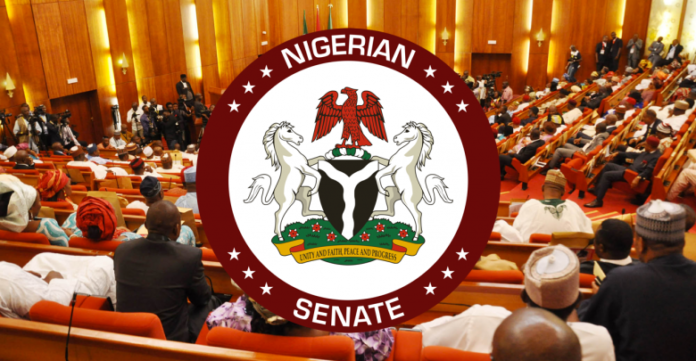The first-ever Senate President of Nigeria was Nnamdi Azikiwe, who was in the position for a few months before assuming the post of Governor-General and President of Nigeria. The current occupant of the position is Godswill Obot Akpabio.
Nigeria operates a bicameral legislature known as the National Assembly. It is divided into the lower chamber (House of Representatives) and the upper chamber (Senate). The Senate is made up of 109 senators who come from the 36 states in Nigeria and the Federal Capital Territory (FCT). Each state has three senatorial zones, therefore, they each send three senators to the National Assembly while the FCT only sends one senator.
Proceedings in the upper chamber of Nigeria’s National Assembly are overseen by the Senate President. The main function of the person in this position is to guide and regulate everything that goes on in the chamber. The position is more than just a ceremonial one as the occupant is second in the Nigerian presidential line of succession. He comes after the Vice President and before the Speaker of the House of Representatives. Nigeria has had fourteen (14) Senate Presidents who have served in the country’s different republics that were interrupted by military dictatorships.
How Nnamdi Azikiwe Became The First Senate President of Nigeria
- Tenure: 1960
- State of Origin: Anambra State
- Political Party: National Council of Nigeria and the Cameroons (NCNC)
- Profession: Journalist, Politician
- Previous Office: Premier of Eastern Nigeria
- Subsequent Office: 3rd Governor-General of Nigeria
- Date of Birth: 16 November 1904
- Died: 11 May 1996 (aged 91)
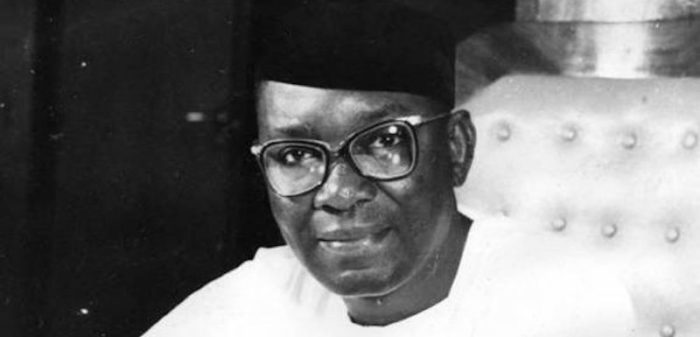
Zik, as he’s fondly called, served as the first Senate President of Nigeria. He assumed the newly established position on the 1st of January 1960 and lasted a few months until the 1st of October 1960 when Nigeria gained independence. Before this role, he was the premier of Nigeria’s Eastern Region, a position he assumed in 1954 when the region became a federating unit.
Details of Azikiwe’s time as Senate President are not well documented as he was in the position for a few months before replacing James Robertson, the last colonial governor-general of Nigeria, in November 1960. In 1963, when Nigeria became a republic, he became the young nation’s first president.
Nigeria gained a degree of self-rule in 1954. However, it was not until the 1st of October, 1960 that the country gained full independence from the United Kingdom. One of the people to have fought for Nigeria’s independence was Nnamdi Azikiwe, an American-educated journalist turned politician described as the father of Nigerian Nationalism.
Other Senate Presidents Nigeria Has Had
1. Dennis Osadebay
- Tenure: 1960-1963
- State of Origin: Delta State
- Political Party: National Council of Nigeria and the Cameroons (NCNC)
- Profession: Lawyer, Politician, Poet, Journalist
- Previous Office: Western Region House of Assembly Member
- Subsequent Office: Premier of the Mid-Western Region
- Date of Birth: 29 June 1911
- Died: December 26, 1994 (aged 83)
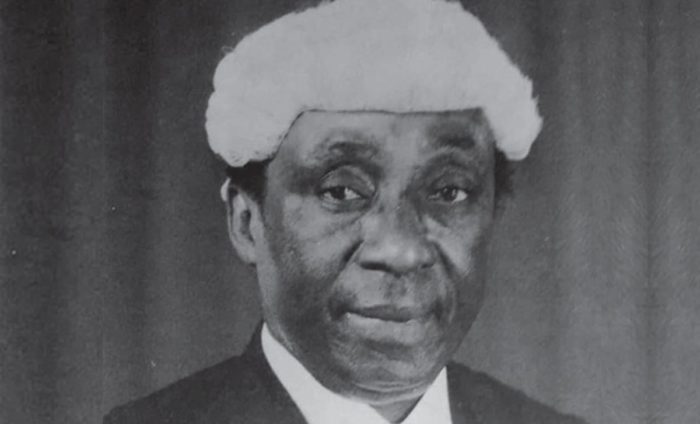
A man of many hats, Dennis Osadebay served as the senate president of Nigeria from 1960 to 1963. He replaced Azikiwe as Senate President of Nigeria in 1960. He stayed in that position until 1963 when the Mid-Western Region (present-day Edo and Delta State) was created and he became the first premier of the region.
He studied in England and upon completion of his studies, he returned to Nigeria and established a law practice in the city of Aba. Before leaving for England, he was one of the founding members of the political party – National Council of Nigeria and the Cameroons (NCNC). Having returned and set up a practice, Osadebay was made a legal adviser of the party he helped found.
It did not take long before he decided to enter politics as he contested and won a seat on the Western Region House of Assembly in 1951. He served as the leader of the opposition in the house that was dominated by the rival Action Group (AG).
Osadebay was a lawyer, a politician, a journalist, and a poet who was one of the first to write in English. He was born in Asaba where he received his early education before completing his studies in Calabar at both Sacred Heart School and Hope Waddell Training Institute. After that, he joined the labour force and worked as a customs officer in various Nigerian coastal cities before moving to England to study Law.
During his time in England, Dennis Osadebay began publishing poetic verses, using events in both his personal life and others around him as an inspiration for his work. Some of the topics his work centred around were the status of black Africans in a colonized Africa and the injustice present in his society.
2. Nwafor Orizu
- Tenure: 1963-1966
- State of Origin: Anambra State
- Political Party: National Council of Nigeria and the Cameroons (NCNC)
- Profession: Politician, Educator
- Previous Office: Minister of Local Government in the Eastern Region
- Subsequent Office: Acting President of Nigeria
- Date of Birth: 17 July 1914
- Died: 1999
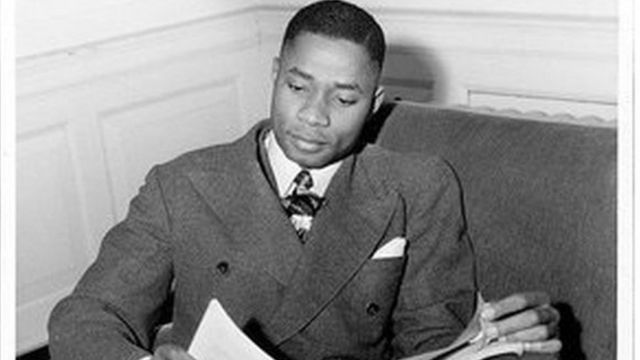
Nwafor Orizu served as a successor to Dennis Osadebay as President of the Nigerian Senate in 1963. He launched a political career by running independently to represent Onitsha Division at the Eastern House of Assembly. He won the election and became chief whip before later joining the NCNC.
Orizu would later be appointed to the position of Minister of Local Government by Eastern Premier Azikiwe before serving as a successor to Dennis Osadebay as President of the Nigerian Senate in 1963. In late 1965, after President Nnamdi Azikiwe left the country for Europe and then the Caribbean, Orizu became Acting President and had all the powers of the President. It was during his time as Acting President that Nigeria had its first coup and the army assumed power.
After voluntarily transferring power to the armed forces, Orizu faded from the political scene and focused on education. He set up schools in Nnewi and served in a government-appointed education-related position.
Orizu is of royal blood. He was born Prince Abyssinia Akweke Nwafor Orizu in 1914 into the royal household of Eze Ugbonyamba, Igwe Orizu I, of the Nnewi Royal family in Anambra State. Orizu received his early education in Nigeria before moving to the United States where he obtained a degree in government at Ohio State University. He subsequently acquired an M.A. degree at Columbia University.
Following the completion of his schooling abroad, Orizu returned to Nigeria where he began to advocate for the adoption of the American system of education. He went on to establish The American Council on African Education (ACAE), a body that offered numerous tuition scholarships to African students. In the late 1940s, Orizu acquired a high school and a printing press before establishing a newspaper called The West Africa Examiner. He was later accused of misappropriating ACAE funds and sentenced to seven years in jail. Orizu’s sentencing was later found to be politically motivated by the British colonial authorities as the chairman of the ACAE in the United States wrote a letter that exonerated him of financial impropriety.
3. Joseph Wayas
- Tenure: 1979-1983
- State of Origin: Cross River State
- Political Party: National Party of Nigeria (NPN)
- Profession: Politician
- Previous Office: Member of the Constituent Assembly
- Subsequent Office: Deputy Chairman of the 1994/1995 National Constitutional Conference Commission
- Date of Birth: 21 May 1941
- Age: 82 years old
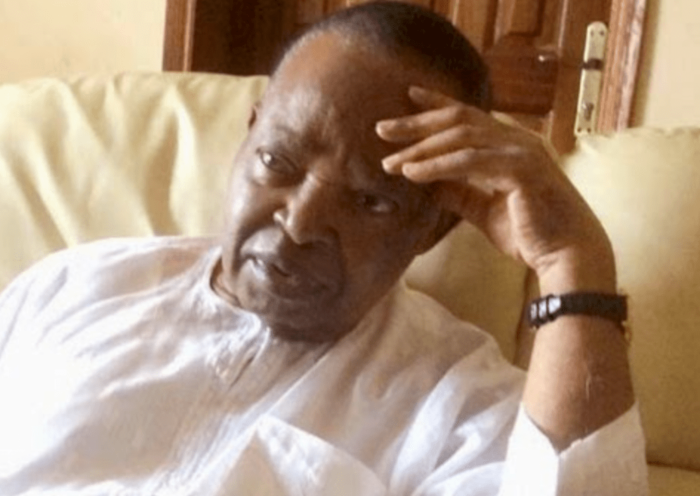
Between 1977 and 1978, he was a member of the Constituent Assembly. He was in this role before he was elected to the Senate following General Olusegun Obasanjo’s termination of military rule in 1979. Wayas, who represented the Ogoja senatorial district, was then appointed Senate President. He is noted to have had an excellent relationship with President Shehu Shagari as they ensured that bills were well discussed and agreed on before being introduced to the House for approval.
Wayas and other politicians of the Shagari administration were preparing for elections when General Muhammadu Buhari staged a coup on New Year’s Eve 1983. He subsequently went into exile before returning in 1987 to be detained. Wayas was later released and he has remained active in politics but has not held any major political position. He was one of the founding members of the All People’s Party in 1998 but later defected to join the People’s Democratic Party in 2001.
Joseph Wayas was born on the 21st of May 1941 in Basang, Obudu, Cross River State. He attended Dennis Memorial Grammar School, Onitsha, Anambra State, before moving to the United Kingdom where he studied at various higher institutions, including the Higher Tottenham Technical College in London and the West Bromwich College of Commerce, Science, and Technology. After completing his education, Wayas returned to Nigeria and took up a number of managerial roles in different local and international companies.
In 1969, Joseph Wayas joined the Federal Government and served as Commissioner for Transport in the South-Eastern State (present-day Akwa Ibom and Cross River State).
4. Iyorchia Ayu
- Tenure: 1992-1993
- State of Origin: Benue State
- Political Party: Social Democratic Party (SDP)
- Profession: Educator, Politician
- Previous Office: Chairman of the Jos University chapter of the Academic Staff Union of Universities (ASUU)
- Subsequent Office: Minister for Education in General Sani Abacha’s military government
- Date of Birth: 15 November 1952
- Age: 71 years old
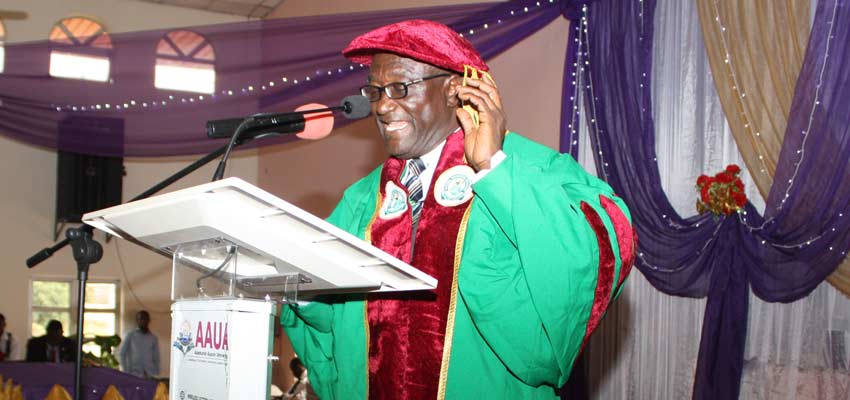
In Nigeria’s Third Republic, Ayu ran for senate and won. He was then appointed Senate President. His tenure was, however, short-lived as he was impeached in 1993. Regardless, the former lecturer continued to remain relevant in government as he was named Minister of Education in General Sani Abacha’s military government. He was in the position from 1993 to 1998.
In 1999, after he assisted in the election of Olusegun Obasanjo as President of Nigeria, Ayu was named Minister of Industry. He was in that position from 1999 to 2001. In 2003, he bagged another ministerial position, this time as Minister of Internal Affairs. He maintained this position until there was a cabinet reshuffle in June 2005 and he was named Minister of Environment. A few months later, however, Ayu was dismissed from government by Obasanjo. Not much has been heard from him.
Before launching a career in politics, Iyorchia Ayu was regarded as one of the most influential members of the Tiv ethnic group. He was at this time a lecturer at the University of Jos. The native of Gboko in Benue State taught sociology and other courses on the art and science of Marxism. He later became the Chairman of the Jos University chapter of the Academic Staff Union of Universities (ASUU).
5. Ameh Ebute
- Tenure: 1993
- State of Origin: Benue State
- Political Party: Social Democratic Party (SDP)
- Profession: Policeman, Lawyer, Magistrate, Politician
- Previous Office: Local Government Chairman
- Subsequent Office: None
- Date of Birth: 16 May 1946
- Age: 77 years old
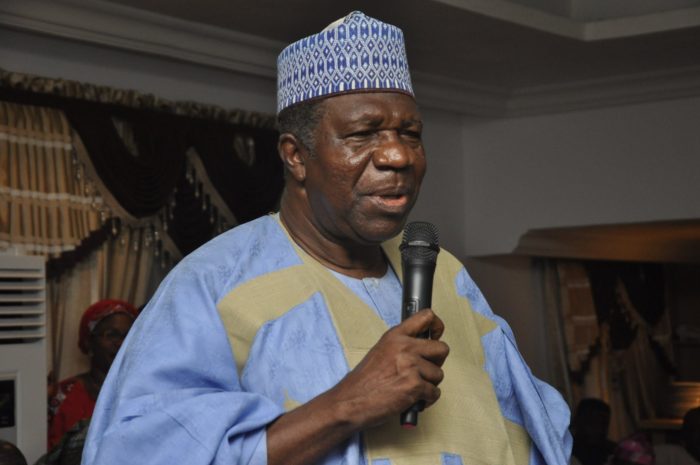
Ameh Ebute briefly served as the senate president of Nigeria in 1993. In 1992, when the regime of General Babangida organized elections to return the country to civilian rule after the 1983 coup of Buhari, Ebute stood for elections and was elected into the Senate for a second time. He would go on to replace Ayu as Senate President after he was impeached but his tenure in the position was brief as General Sani Abacha took over in November 1993.
Ameh Ebute tried to return to politics in 1999, contesting for a senatorial position. He, however, lost to future Senate President David Mark.
Ameh Ebute was one of the pioneers of a primary school built in his village in 1955. His parents and almost every other person around him were illiterates who farmed as a source of living. He was inspired to attend school after one of his older sister’s suitors taught him numbers and alphabets. Ebute would go on to complete his education after paying his fees with proceeds from planting yams and hunting bushmeat.
In January 1962, he left his village for Kaduna, the former headquarters of the region, to join the Police Training College. Upon completion of his training, he was posted to Maiduguri. While in the police, Ebute sat as a private candidate for WASSCE and passed. In 1970, he applied to study for a diploma in Law at Ahmadu Bello University (ABU) and was admitted. He graduated in 1974 and was called to Bar the following year. He went on to serve as an associate magistrate in Makurdi before quitting and entering private practice.
Ameh Ebute’s entry into politics came in 1976 during Obasanjo’s reign as Military Head of State. There were local government reforms at this time and elections for councillors were to be held. Ebute stood as a councillor in his area and was elected. The following year, he was elected as chairman of Okpokwu Local Government in Benue State. While he later resigned from the position to return to private practice, he made a comeback to politics to run for a senatorial position in 1978 and was elected in 1979 when Nigeria returned to democratic rule.
6. Evan Enwerem
- Tenure: 1999
- State of Origin: Imo State
- Political Party: People’s Democratic Party (PDP)
- Profession: Politician
- Previous Office: Governor of Imo State in 1991
- Subsequent Office: None
- Date of Birth: 29 October 1935
- Died: 2 August 2007 (aged 71)
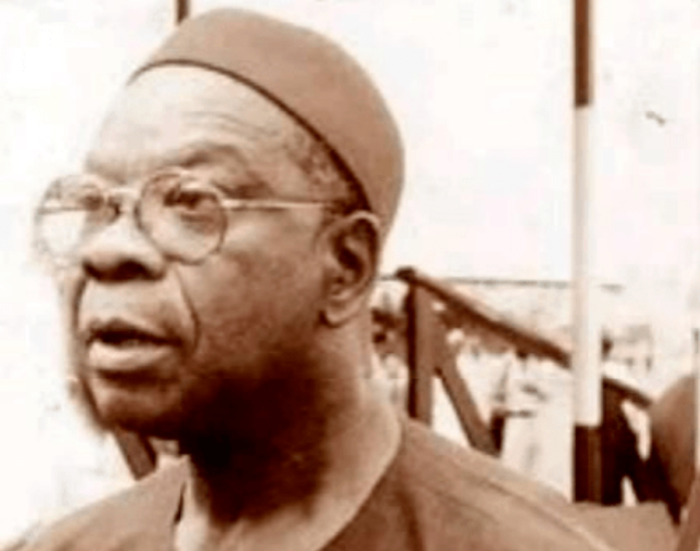
Enwerem entered politics in 1991 when he was elected governor of Imo State. He served in the position from 1992 to 1993 when General Abacha seized power. In 1991, when Nigeria returned to democratic rule, he was elected to represent Imo-East Senatorial Zone in the National Assembly. Enwerem was subsequently nominated to serve as Senate President but he did not hold the position for a long time as a Senate Committee began investigating him for allegations of corruption. After just a few months, Enwerem was removed from office but remained a member of the Senate. He remained in office until 2003 when he decided to leave politics.
Evan Enwerem was born and raised in Ikeduru, Imo State. He received his primary and secondary school education in the area before leaving for the United Kingdom to study at the University of Southampton. Enwerem would later return to Nigeria to work in the civil service. Between 1980 and 1983, he notably served as the chairman of the Nigerian Airports Authority.
He passed away a few years later in 2007.
7. Chuba Okadigbo
- Tenure: 1999-2000
- State of Origin: Anambra State
- Political Party: Peoples Democratic Party (PDP)
- Profession: Educator, Writer, Politician
- Previous Office: Political Adviser and Strategist to President Shehu Shagari
- Subsequent Office: None
- Date of Birth: December 17, 1941
- Died: September 25, 2003 (aged 61)
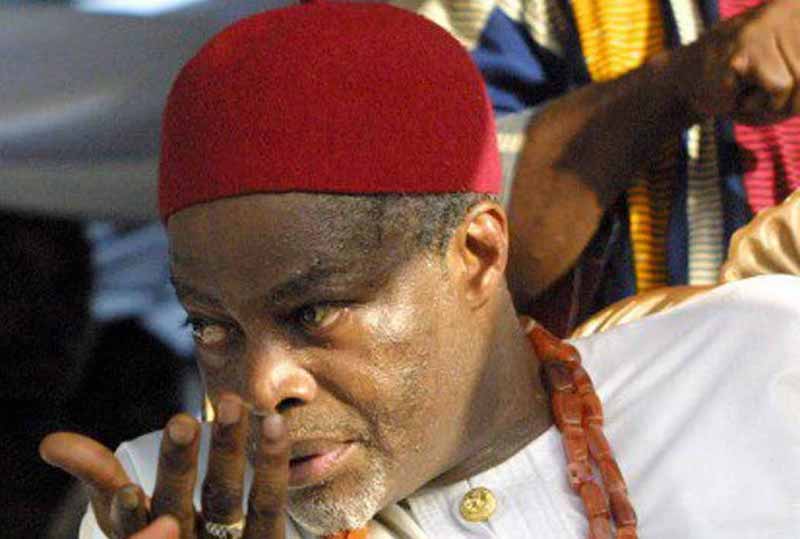
Chuba Okadigbo’s tenure as the senate president of Nigeria in 1991 was short-lived. remained on the fringes of politics after his return to Nigeria until 1999 when he was elected to represent Anambra North Senatorial Zone at the National Assembly. Upon election to the Senate, Okadigbo was widely regarded as a favourite to assume the role of President of the Senate. However, a disagreement with the executive arm meant that the position went to Evan Enwerem. Enwerem was later ousted and Okadigbo took up the position but his time as Senate President was short-lived as he was charged with corruption and was impeached from the position although he remained in the house as a senator.
He was born in present-day Delta State but hails from Oyi Local Government Area in Anambra State. He received his early education in the country before moving abroad to further his studies. Okadigbo attended Karl Marx University, Leipzig, East Germany, before moving to the United States where he excelled in his studies and caught the attention of many people.
Before the age of 34, he acquired a Master’s in Political Science, one doctorate degree in Political Science, and another in Philosophy. He went on to become Assistant Professor, later adjunct Associate Professor of Philosophy at the University of the District of Columbia. In addition to this role, he was also an adjunct Assistant Professor of Politics at the Catholic University of America and an adjunct Assistant Professor of Politics at Howard University.
In 1975, Okadigbo opted to return to Nigeria where he took up various academic positions. In addition to serving as a philosophy lecturer at the University of Nigeria, Nsukka, he was the director-general of the Center for Interdisciplinary and Political Studies. He also held the position of Professor of Philosophy at Bigard Memorial Senior Seminary School, Enugu. The high-flying academician would go on to enter into politics in 1979 when President Shehu Shagari appointed him as his political adviser and strategist.
Chuba Okadigbo later passed away in 2003 after unsuccessfully running to be Vice President under the ticket of Muhammadu Buhari.
8. Anyim Pius Anyim
- Tenure: 2000-2003
- State of Origin: Ebonyi State
- Political Party: Peoples Democratic Party (PDP)
- Profession: Lawyer, Politician
- Previous Office: Head of Protection Department at the National Commission for Refugees, Abuja
- Subsequent Office: Secretary to the Government of the Federation under President Goodluck Jonathan
- Date of Birth: 19 February 1961
- Age: 63 years old
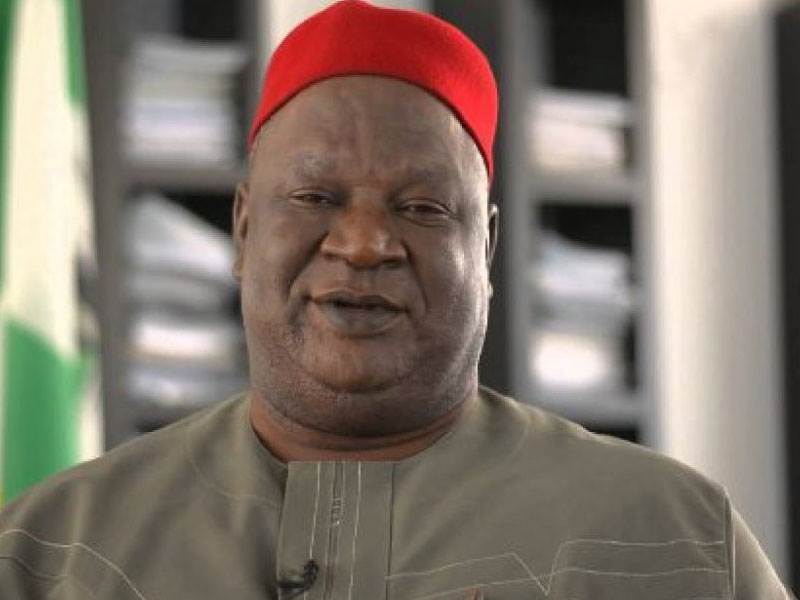
Following the impeachment of Chuba Okadigbo as President of the Senate, Anyim Pius Anyim was voted by his colleagues to take the position. He entered politics in 1999 and assumed the role of the senate president from 2000 – 2003.
Anyim is a native of Ishiagu in Ivo Local Government Area of Ebonyi State. He was elected to represent Ebonyi South Senatorial Zone. The Senator received his primary school education in his hometown before attending the Federal School of Arts and Science in Aba and then Abia State University, Uturu.
Anyim became noteworthy on the national scene in 1992 when he became the Head of the Protection Department at the National Commission for Refugees, Abuja. He remained in this role for a while before entering into politics in 1999 when he successfully ran for Senate. After assuming the role of Senate President, Anyim and President Obasanjo never saw eye to eye on a number of issues. At one point, he tried to impeach the Commander in Chief of the Armed Forces of Nigeria but the move failed.
In 2003, Anyim opted to not seek re-election as he was at war with both the president and the governor of his home state. He instead funded the campaigns of opposition members in his state. Anyim Pius Anyim would remain on the political scene in the following years, contesting for the Chairmanship of the PDP among other things. In 2011, he made his comeback to mainstream politics after he was appointed by President Goodluck Jonathan as Secretary to the Government of the Federation (SGF).
9. Adolphus Wabara
- Tenure: 2003-2005
- State of Origin: Abia State
- Political Party: Peoples Democratic Party (PDP)
- Profession: Businessman, Politician
- Previous Office: Member, Federal House of Representatives (1992 – 1993)
- Subsequent Office: Secretary of the Board of Trustees of the PDP
- Date of Birth: June 1, 1948
- Age: 75 years old
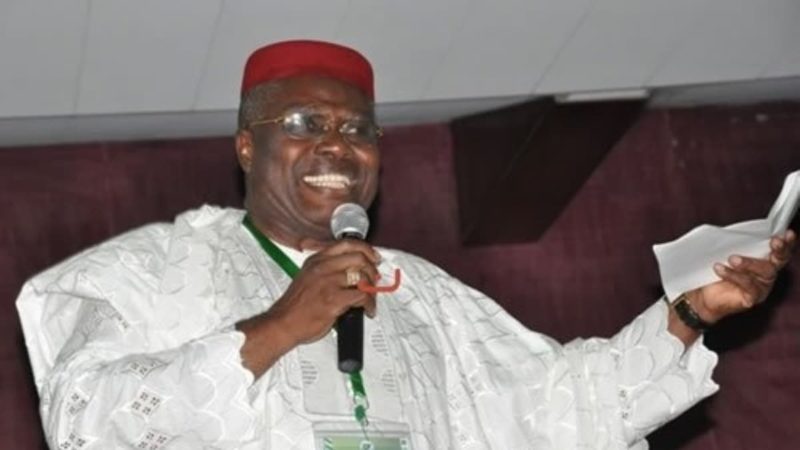
Adolphus Wabara served two terms as Senator. He became President of the Senate at the beginning of his second term in 2003. His time in the position was controversial as he was investigated for financial misconduct.
Adolphus Wabara was born on the 1st of June, 1948 in Ohambele, Ndoki, in Ukwa East local government area of Abia State. Not much is known about his early life but it is widely said that he came from humble beginnings. This, however, did not stop him from reaching great heights in life as he traveled abroad to further his studies. Wabara attended Kiev State University in Ukraine where he obtained a Master’s degree.
In the early 1990s, the Abia State native made his entry into mainstream politics as Nigeria’s military government planned to hand over power to civilian rule. He would successfully run for a seat at the Federal House of Representatives but his time in the position was short-lived as the military soon took over affairs again. Between 1996 and 1998, Wabara served as the Executive Chairman of Ukwa East LGA before he was elected to the Senate in 1999.
Several other allegations were made against him as a senator, including one that said that he took a $400,000 bribe from the education minister to facilitate passage of the annual budget. In April 2005, after having faced extensive pressure, he resigned from the position. Wabara faced extended legal battles in the following years but all cases were eventually dropped.
10. Ken Nnamani
- Tenure: 2005-2007
- State of Origin: Enugu State
- Political Party: Peoples Democratic Party (PDP)
- Profession: Businessman, Industrial Consultant, Politician
- Previous Office: None
- Subsequent Office: None
- Date of Birth: 2 November 1948
- Age: 75 years old
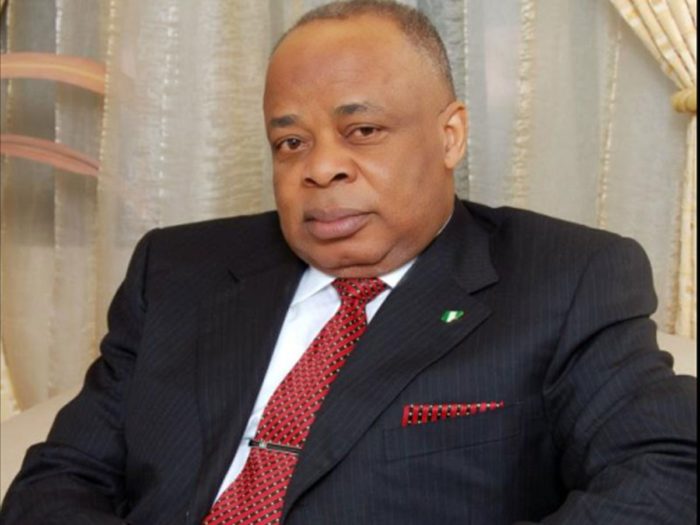
Ken Nnamani served in the position of the Senate president until 2007 when he left the Senate. He made his entry into politics in 2003 when he was elected to the Senate to represent Enugu East Senatorial Zone. The Senator was carrying out his duties with excellence when the opportunity came for him to become President of the Senate following the resignation of Adolphus Wabara.
Before his emergence in the senate, he worked as a marketing executive and consultant for various international companies, including Du Pont De Nemours International, Nova Chemicals International, and Maredec Limited. Nnamani had received his education in the United States. He acquired both a Bachelor of Business Administration degree and a Master of Business Administration degree from Ohio University in Athens, Ohio.
As a member of the Senate, Nnamani chaired the Committee on Federal Character & Governmental Affairs. He was also a member of other committees like Privatization, Federal Capital Territory, and Appropriation & Finance.
11. David Mark
- Tenure: 2007-2015
- State of Origin: Benue State
- Political Party: Peoples Democratic Party (PDP)
- Profession: Soldier, Politician
- Previous Office: Military Governor of Niger State/Minister of Communication
- Subsequent Office: None
- Date of Birth: April 1948
- Age: 76 years old
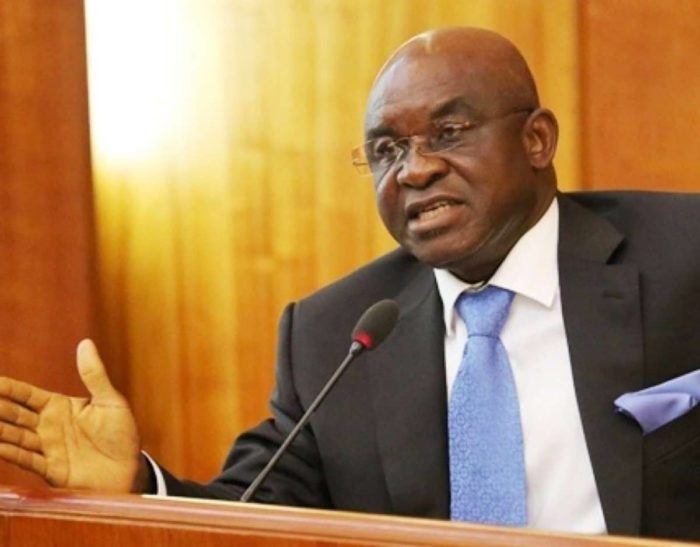
David Mark served as the senate president of Nigeria from 2007 to 2015. He successfully ran for the Senate in 1999 and won. At the beginning of his third term (2007) as a Senator representing Benue South Senatorial Zone, he became President of the Senate. While David Mark would go on to become the longest-serving Senator in Nigeria’s history (20 years), his time as the second in line of succession to the Nigerian presidency (2007-2015) was not without some controversy. He faced allegations of corrupt enrichment, including allegations of having bank accounts in foreign countries. It was also during his time that lawmakers in the country became one of the highest-paid in the world.
David Mark is one of the many retired Nigerian military officers to have ventured into politics in 1999. The Otukpo, Benue State native attained the level of Army Brigadier General. He attended the Nigerian Defence Academy before he was commissioned as a 2nd Lieutenant in 1970. The following year, he became a Captain. Mark got his first political post in 1976 when he was made Chairman Abandoned Properties Implementation Committee in the Eastern region. He would later serve as military Governor of Niger State in the 1980s and then as Minister of Communications.
In the latter position, he oversaw the affairs of the Nigerian Telecommunications Limited (NITEL) and Nigerian Postal Service (NIPOST).
12. Bukola Saraki
- Tenure: 2015 -2019
- State of Origin: Kwara State
- Political Party: All Progressives Congress (APC)
- Profession: Physician, Businessman, Politician
- Previous Office: Governor of Kwara State
- Subsequent Office: None
- Date of Birth: 19 December 1962
- Age: 61 years old
Bukola Sakari became the Senate President of Nigeria in 2015 while serving for the second term as Kwara Central Senatorial Zone in the National Assembly. He worked as a doctor in the United Kingdom for a few years in the late 1980s before returning to Nigeria to serve as a director of Société Générale Bank (Nig) Ltd in the 1990s. In the year 2000, after Olusegun Obasanjo became president, he recruited Saraki to work as a Special Assistant to the President on Budget.
He worked in that position for a few years before gaining political aspirations and running for governor of Kwara State. The young man was successful in his bid as he beat the incumbent to assume office in 2003. His time as governor was a breath of fresh air in the state as he oversaw reforms in various parts of the economy. It was no surprise that he was re-elected in 2007.
Following the completion of his two terms as governor, Bukola Saraki ran to represent Kwara Central Senatorial Zone in the National Assembly. He won the election and succeeded his sister in the position. As a Senator, Saraki worked to bring reforms to areas of health, food security, education, and the environment. In 2015, he ran for reelection and won. He then went on to become Senate President of Nigeria after outmaneuvering his closest competitor. He surpassed all of his predecessors in the position by passing 201 bills and clearing 138 public petitions.
Unlike others on this list, Bukola Saraki was born outside of Nigeria. He was born in London to Florence Morenike and Olusola Saraki. His parents were wealthy and influential; his father notably served as a Senator in the Second Nigerian Republic. For his education, Saraki attended King’s College in Lagos before returning to the United Kingdom to attend Cheltenham College. He subsequently enrolled in the University of London’s London Hospital Medical College where he obtained a Bachelor of Medicine, Bachelor of Surgery.
Not without controversy though, Saraki has been accused of corruption as both a Senator and Governor but he has fought tooth and nail to clear his name. He described such allegations as political vendettas and witch hunts. In 2019, Saraki ran for reelection but lost.
13. Ahmed Ibrahim Lawan
- Tenure: 2019-Present
- State of Origin: Yobe State
- Political Party: All Progressives Congress (APC)
- Profession: Politician
- Previous Office: Member of the House of Representatives
- Subsequent Office: N/A
- Date of Birth: 12 January 1959
- Age: 65 years old
Following Saraki’s failed bid to return to the Senate in 2019, Ahmad Lawan replaced him as Senate President of Nigeria. Lawan was famously selected by the ruling party to head the Senate in 2015 but was outmanoeuvred by Saraki who had majority support from his colleagues, both in the ruling party and in the opposition.
Lawan was born in Gashua, a community in the north of British Nigeria (present-day Yobe State). He attended primary and secondary school in his community before enrolling in the University of Maiduguri in 1984 where he acquired a Bachelor’s degree in Geography. He went on to acquire a Master’s and Doctorate in Remote Sensing/GIS, the former from Ahmadu Bello University and the latter from Cranfield University. In between the time he was acquiring knowledge, he served as an Education Officer in the Yobe State Ministry of Education. He later worked as a lecturer at the University of Maiduguri.
Following the return to civilian rule in 1999, he successfully ran to represent his constituency – Bade/Jakusko at the House of Representatives. After two terms in the position, he ran for the Senate in 2007 to represent Yobe North Senatorial Zone and was successful. He has since won reelection thrice, becoming Senate President in 2019.
14. Godswill Obot Akpabio
- Tenure: June 13, 2023 – present
- State of Origin: Akwa Ibom
- Political Party: All Progressives Congress (APC)
- Profession: Lawyer, Politician
- Previous Offices: Governor of Akwa Ibom State, minister for Niger Delta Affairs, Senator representing Akwa Ibom North-West Senatorial District
- Date of Birth: 9 December 1962
- Age: 61 years old
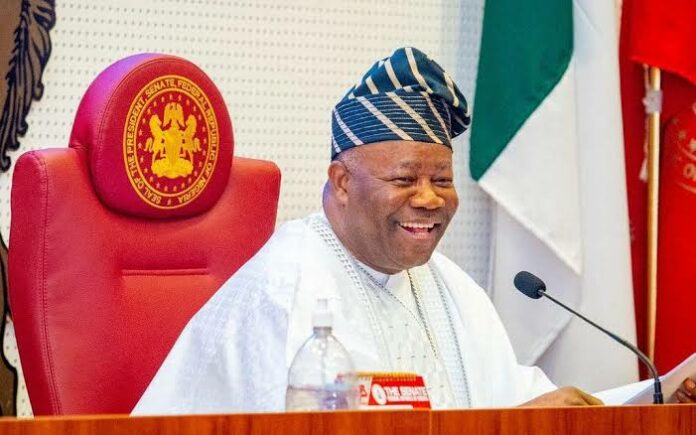
Godswill Akpabio is the 15th President of the Nigerian Senate, having assumed office on June 13th 2023 following his election into the position by his colleagues. He replaced Ahmed Lawan after defeating Senator Abdulaziz Yari, a former Governor of Zamfara State in the fiercely contested election.
Akpabio was a former teacher and later appointed Honourable Commissioner for Petroleum and Natural Resources by the then Governor Obong Victor Attah in Akwa Ibom State in 2002. He also served as the governor of Akwa Ibom State from 2007 to 2015. Between 2015 – 7 August 2018. he succeeded Abiodun Olujimi as the senate minority leader.
In 2019, Godwill was appointed the Minister for Niger Delta Affairs by Muhammad Buhari, however, he resigned in 2022 to join the presidential primaries race of the APC. His emergence as the Senatorial candidate for Akwa Ibom North-West Senatorial District earned him heavy criticism from the public including some members of his party in his state.
Godswill Akpabio has been a member of the APC since 2018.
Summary of the List of Senate Presidents of Nigeria
Nnamdi Azikiwe – 1960
Dennis Osadebay – 1960–1963
Nwafor Orizu – 1963–1966
Joseph Wayas – 1979–1983
Iyorchia Ayu – 1992–1993
Ameh Ebute – 1993
Evan Enwerem – 1999
Chuba Okadigbo – 1999–2000
Anyim Pius Anyim – 2000–2003
Adolphus Wabara – 2003–2005
Ken Nnamani – 2005–2007
David Mark – 2007–2015
Bukola Saraki – 2015–2019
Ahmed Lawan – 2019–2023
Godswill Obot Akpabio – June 13, 2023 – present
Frequently Asked Questions
Who is the Senate President of Nigeria?
Senator Godwill Obot Akpabio is the senate president of Nigeria. He is the 15th president of the Nigerian Senate, having assumed office on June 23, 2023. Akpabio was preceded by Ahmed Lawal.
Who is the Deputy Senate President of Nigeria?
Senator Barau Jibrin is the deputy senate president of Nigeria. The Kano-born politician was appointed as deputy senate president of the 10th Senate on 13 June 2023, as his nomination for the enviable position went unopposed.
